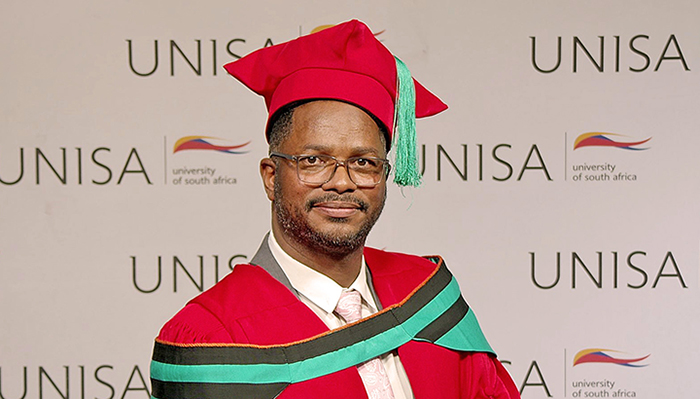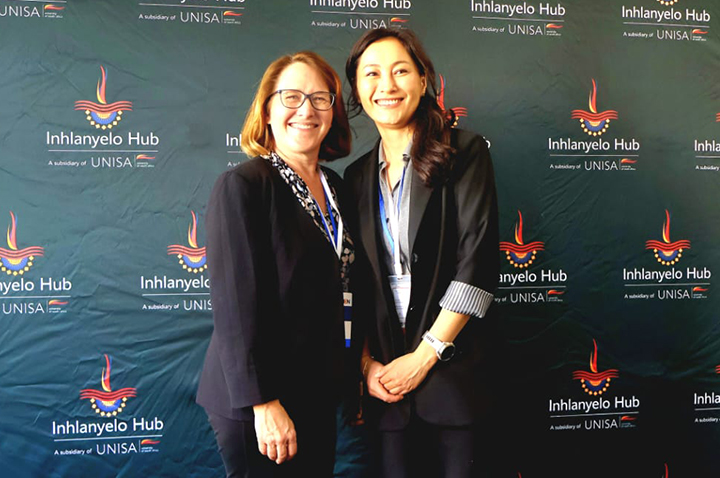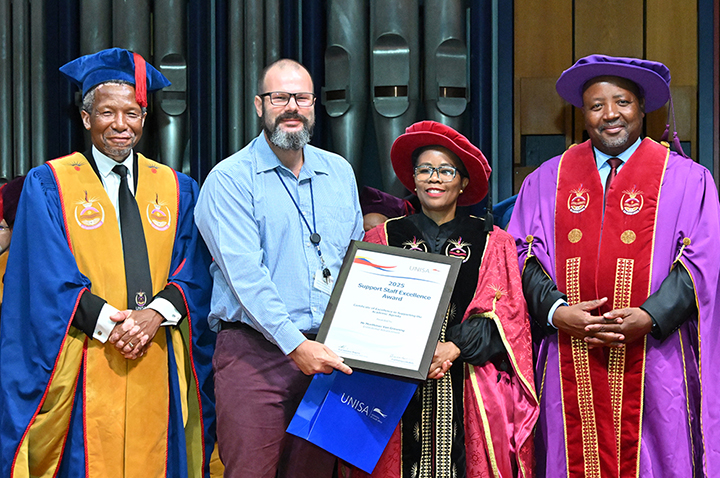

Prof Anthony Brown, School of Interdisciplinary Research and Graduate Studies, College of Graduate Studies
The Zulu greeting Sawubona, meaning "I see you", offers a transformative theoretical framework for sexual and gender diversity in South Africa, Prof Anthony Brown, from the College of Graduate Studies (CGS), argued during his inaugural lecture on 14 August. He specialises in inclusive education, with particular expertise in gender identity, sexual orientation, and comprehensive sexuality education.
Referring to the childhood game, Block Block Bambile, which he played in the dusty streets of Kuisebmond in Namibia, Brown said the game offered joy and disguise. Within the innocent game lies a powerful metaphor for the lived experiences of LGBTQI+ learners, for whom visibility in schools can mean exclusion rather than belonging, he argued.
Visibility for gender-diverse learners often leads to discrimination, marginalisation and psychological harm. In violently heteronormative educational spaces, survival demands exhausting performativity. When identities don’t align with binary norms, learners face "abjection" - degradation, which leads to their exclusion from a liveable identity.
Transgender and gender non-conforming students in South Africa experience "compound marginalisation" - discrimination compounded by race, class and geography. Western frameworks of sexuality and gender often reinforce these exclusions rather than resolve them. But what if recognition could affirm, instead of punish?
The African greeting Sawubona - "we see you" - offers a radical alternative. More than a greeting, it reflects a communal understanding of personhood, as expressed in the ubuntu concept of: "A person is a person through other persons". This relational way of knowing contrasts sharply with Western individualism and suggests that inclusion can be rooted in African cultural values.
In this context, Sawubona provides a foundation for African-centred inclusive education - one that honours the full humanity of LGBTQI+ learners. It calls for visibility that affirms not only sexual or gender identity, but spiritual, cultural and ancestral wholeness.
Ubuntu sees the whole. Exclusion is not an expression of African tradition, but a betrayal thereof. By greeting our learners with a genuine Sawubona, we transform classrooms into communities of belonging. Diversity becomes a strength, and recognition becomes the first act of inclusion.
Let Sawubona guide our pedagogy - and our hearts - as we work toward educational spaces that are truly plural, loving and free, Brown said.
* By Hanli Wolhuter, Communication and Marketing Specialist, College of Graduate Studies
Publish date: 2025-08-15 00:00:00.0
 Unisa roundtable focuses on empowering SA women to lead in innovation
Unisa roundtable focuses on empowering SA women to lead in innovation
 Unisan recognised for web excellence
Unisan recognised for web excellence
 Office of the Dean of Students participates in leadership camp
Office of the Dean of Students participates in leadership camp
 Unisa project fosters digital and pedagogical innovation in Limpopo schools
Unisa project fosters digital and pedagogical innovation in Limpopo schools
 Unisa student wins prestigious national leadership award
Unisa student wins prestigious national leadership award